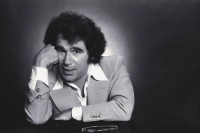Latest Sheet Music
Tchaikovsky

Pyotr Il'yich Tchaikovsky (May 7 1840 â November 6 1893) was a Russian composer of the Romantic era. While not part of the nationalistic music group known as "The Five", Tchaikovsky wrote music which, in the opinion of Harold Schonberg, was distinctly Russian: plangent, introspective, with modally-inflected melody and harmony.
Aesthetically, Tchaikovsky remained open to all aspects of Saint Petersburg musical life. He was impressed by Serov and Balakirev as well as the classical values upheld by the conservatory. Both the progressive and conservative camps in Russian music at the time attempted to win him over. Tchaikovsky charted his compositional course between these two factions, retaining his individuality as a composer as well as his Russian identity. In this he was influenced by the ideals of his teacher Nikolai Rubinstein and Nikolai's brother Anton.
Tchaikovsky's musical cosmopolitanism led him to be favored by many Russian music-lovers over the "Russian" harmonies and styles of Mussorgsky, Borodin and Rimsky-Korsakov.
Nonetheless he frequently adapted Russian traditional melodies and dance forms in his music, which enhanced his success in his home country. The success in St. Petersburg at the premiere of his Third Orchestral Suite may have been due in large part to his concluding the work with a polonaise. He also used a polonaise for the final movement of his Third Symphony.
Aesthetically, Tchaikovsky remained open to all aspects of Saint Petersburg musical life. He was impressed by Serov and Balakirev as well as the classical values upheld by the conservatory. Both the progressive and conservative camps in Russian music at the time attempted to win him over. Tchaikovsky charted his compositional course between these two factions, retaining his individuality as a composer as well as his Russian identity. In this he was influenced by the ideals of his teacher Nikolai Rubinstein and Nikolai's brother Anton.
Tchaikovsky's musical cosmopolitanism led him to be favored by many Russian music-lovers over the "Russian" harmonies and styles of Mussorgsky, Borodin and Rimsky-Korsakov.
Nonetheless he frequently adapted Russian traditional melodies and dance forms in his music, which enhanced his success in his home country. The success in St. Petersburg at the premiere of his Third Orchestral Suite may have been due in large part to his concluding the work with a polonaise. He also used a polonaise for the final movement of his Third Symphony.
Rimsky-Korsakov
Nikolai Andreyevich Rimsky-Korsakov (Russian: Никола́й Андре́евич Ри́мский-Ко́рсаков, Nikolaj Andreevič Rimskij-Korsakov, Russian pronunciation: ) (18 March 1844, – 21 June 1908) was a Russian composer, and a member of the group of composers known as The Five. He was a master of orchestration. His best-known orchestral compositions—Capriccio Espagnol, the Russian Easter Festival Overture, and the symphonic suite Scheherazade—are considered staples of the classical music repertoire, along with suites and excerpts from some of his 15 operas. Scheherazade is an example of his frequent use of fairy tale and folk subjects.
Rimsky-Korsakov believed, as did fellow composer Mily Balakirev and critic Vladimir Stasov, in developing a nationalistic style of classical music. This style employed Russian folk song and lore along with exotic harmonic, melodic and rhythmic elements in a practice known as musical orientalism, and eschewed traditional Western compositional methods. However, Rimsky-Korsakov appreciated Western musical techniques after he became a professor of musical composition, harmony and orchestration at the Saint Petersburg Conservatory in 1871. He undertook a rigorous three-year program of self-education and became a master of Western methods, incorporating them alongside the influences of Mikhail Glinka and fellow members of The Five. His techniques of composition and orchestration were further enriched by his exposure to the works of Richard Wagner.
Rimsky-Korsakov believed, as did fellow composer Mily Balakirev and critic Vladimir Stasov, in developing a nationalistic style of classical music. This style employed Russian folk song and lore along with exotic harmonic, melodic and rhythmic elements in a practice known as musical orientalism, and eschewed traditional Western compositional methods. However, Rimsky-Korsakov appreciated Western musical techniques after he became a professor of musical composition, harmony and orchestration at the Saint Petersburg Conservatory in 1871. He undertook a rigorous three-year program of self-education and became a master of Western methods, incorporating them alongside the influences of Mikhail Glinka and fellow members of The Five. His techniques of composition and orchestration were further enriched by his exposure to the works of Richard Wagner.
Ivan Lins
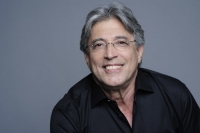
Ivan Guimarães Lins is a Latin Grammy-winning Brazilian musician. He has been an active performer and songwriter of Brazilian popular music and jazz for over thirty years. His first hit, "Madalena", was recorded by Elis Regina in 1970. "Love Dance", a hit in 1989, is one of the most recorded songs in musical history.
Dire Straits
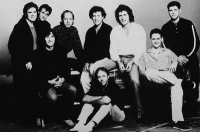
Dire Straits were an English rock band, formed in 1977 by Mark Knopfler (guitar and vocals), his brother David Knopfler (guitar), John Illsley (bass), and Pick Withers (drums), and subsequently managed by Ed Bicknell. Although the band was formed in an era when punk rock reigned, Dire Straits worked within the conventions of classic rock, albeit with a stripped-down sound that appealed to modern audiences weary of the overproduced stadium rock of the 1970s. In their early days, Mark and David requested that pub owners turn down the amps so that patrons could converse while the band played — indicative of their unassuming demeanor. Despite this oddly self-effacing approach to rock and roll, Dire Straits soon became hugely successful, with their first album going multi-platinum globally.
The band's best-known songs include "Sultans of Swing", "Romeo and Juliet", "Tunnel of Love", "Telegraph Road", "Private Investigations", "Money for Nothing", "Walk of Life", "So Far Away", "Brothers in Arms" and "Calling Elvis".
Dire Straits and Mark Knopfler have sold in excess of 118 million albums to date.
The band's best-known songs include "Sultans of Swing", "Romeo and Juliet", "Tunnel of Love", "Telegraph Road", "Private Investigations", "Money for Nothing", "Walk of Life", "So Far Away", "Brothers in Arms" and "Calling Elvis".
Dire Straits and Mark Knopfler have sold in excess of 118 million albums to date.
Anton Webern
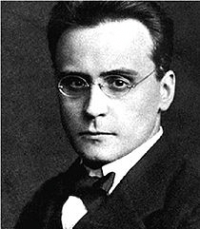
Anton Webern (3 December 1883 – 15 September 1945) was an Austrian composer and conductor. He was a member of the Second Viennese School. As a student and significant follower of Arnold Schoenberg, he became one of the best-known exponents of the twelve-tone technique; in addition, his innovations regarding schematic organization of pitch, rhythm and dynamics were formative in the musical technique later known as total serialism.
Yellowcard

Yellowcard was an American rock band that formed in Jacksonville, Florida, in 1997 and were based in Los Angeles beginning in 2000. The band is well known for its singles "Ocean Avenue", "Only One", and "Lights and Sounds". The group's music is distinctive within its genre because it features the prominent use of a violin. The band released ten studio albums, with its most recent and final one, Yellowcard, released on September 30, 2016. The band played its final show on March 25, 2017, at the House of Blues in Anaheim, California.
Hadrien Feraud
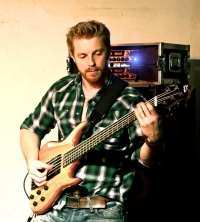
Hadrien Feraud (born August 16, 1984 in Paris) is a French jazz bassist.Hadrien Feraud was born into a very musical family. His parents -- who are also musicians -- immersed him at a very young age in various musical environments: rock 'n roll, blues, funk, R&B, new wave, and, of course, jazz. Hadrien began studying guitar at age 8, taking lessons from his father. He also had a deep interest in film scores.
Shigeru Umebayashi
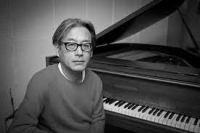
Shigeru Umebayashi (梅林茂, Umebayashi Shigeru, ) (born February 19, 1951) is a Japanese composer.
Once the leader and bass player of Japan's new wave rock band EX, composer Shigeru Umebayashi began scoring films in 1985 when the band broke up. He has more than 30 Japanese and Chinese film scores to his credit and is perhaps best known in the West for "Yumeji's Theme" (originally from Seijun Suzuki's Yumeji), included in director Wong Kar-wai's In the Mood for Love (2000). Umebayashi scored most of Wong Kar-wai's follow-up film, 2046 (2004), and House of Flying Daggers. He is also the composer for the music of the first Serbian spectacle, Charleston & Vendetta. Umebayashi received the special "Tomislav Pinter Award" at Avvantura Film Festival Zadar (Croatia) in 2013 during his stay as member of the official Jury.
Once the leader and bass player of Japan's new wave rock band EX, composer Shigeru Umebayashi began scoring films in 1985 when the band broke up. He has more than 30 Japanese and Chinese film scores to his credit and is perhaps best known in the West for "Yumeji's Theme" (originally from Seijun Suzuki's Yumeji), included in director Wong Kar-wai's In the Mood for Love (2000). Umebayashi scored most of Wong Kar-wai's follow-up film, 2046 (2004), and House of Flying Daggers. He is also the composer for the music of the first Serbian spectacle, Charleston & Vendetta. Umebayashi received the special "Tomislav Pinter Award" at Avvantura Film Festival Zadar (Croatia) in 2013 during his stay as member of the official Jury.
Duke Ellington

Edward Kennedy "Duke" Ellington (April 29, 1899 â May 24, 1974) was an American composer, pianist, and bandleader.
Recognized during his life as one of the most influential figures in jazz, if not in all American music, Ellington's reputation has increased since his death, including a special award citation from the Pulitzer Prize Board.
Ellington called his style and sound "American Music" rather than jazz, and liked to describe those who impressed him as "beyond category", including many of the musicians who served with his orchestra, some of whom were themselves considered among the giants of jazz and remained with Ellington's orchestra for decades. While many were noteworthy in their own right, it was Ellington that melded them into one of the most well-known orchestral units in the history of jazz. He often composed specifically for the style and skills of these individuals, such as "Jeep's Blues" for Johnny Hodges, "Concerto for Cootie" ("Do Nothing Till You Hear from Me") for Cootie Williams and "The Mooche" for Tricky Sam Nanton. He also recorded songs written by his bandsmen, such as Juan Tizol's "Caravan" and "Perdido" which brought the "Spanish Tinge" to big-band jazz. After 1941, he frequently collaborated with composer-arranger Billy Strayhorn, who he called his alter-ego.
One of the twentieth century's best-known African-American celebrities, Ellington recorded for many American record companies, and appeared in several films. Ellington and his orchestra toured the United States and Europe regularly before and after World War II. Ellington led his band from 1923 until his death in 1974. His son Mercer Ellington took over the band until his death from cancer in 1996. Paul Ellington, Mercer's youngest son, took over the Orchestra from there and after his mother's passing took over the Estate of Duke and Mercer Ellington.
Recognized during his life as one of the most influential figures in jazz, if not in all American music, Ellington's reputation has increased since his death, including a special award citation from the Pulitzer Prize Board.
Ellington called his style and sound "American Music" rather than jazz, and liked to describe those who impressed him as "beyond category", including many of the musicians who served with his orchestra, some of whom were themselves considered among the giants of jazz and remained with Ellington's orchestra for decades. While many were noteworthy in their own right, it was Ellington that melded them into one of the most well-known orchestral units in the history of jazz. He often composed specifically for the style and skills of these individuals, such as "Jeep's Blues" for Johnny Hodges, "Concerto for Cootie" ("Do Nothing Till You Hear from Me") for Cootie Williams and "The Mooche" for Tricky Sam Nanton. He also recorded songs written by his bandsmen, such as Juan Tizol's "Caravan" and "Perdido" which brought the "Spanish Tinge" to big-band jazz. After 1941, he frequently collaborated with composer-arranger Billy Strayhorn, who he called his alter-ego.
One of the twentieth century's best-known African-American celebrities, Ellington recorded for many American record companies, and appeared in several films. Ellington and his orchestra toured the United States and Europe regularly before and after World War II. Ellington led his band from 1923 until his death in 1974. His son Mercer Ellington took over the band until his death from cancer in 1996. Paul Ellington, Mercer's youngest son, took over the Orchestra from there and after his mother's passing took over the Estate of Duke and Mercer Ellington.
Saverio Mercadante
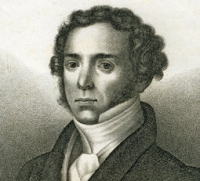
Saverio Mercadante (full name Giuseppe Saverio Raffaele Mercadante) (born September 17, 1795, Altamura, Italy - died December 17, 1870, Naples) was an Italian musician and composer, particularly known for his operas of the Romantic period Mercandante was the illegitimate child of a widow and a civil servant. He was born in a village near Bari. In 1808 he entered the Naples Conservatory using a false baptismal certificate dated 1797. There he took lessons from "Giovanni Furno", "Giacomo Tritto" and later "Niccolò Zingarelli", who were also the teachers of Bellini. He was the conductor of the conservatory students' orchestra, and some of his own compositions were played in a concert given by this orchestra. The famous Rossini was his assistant in these concerts.
Danny Elfman

Daniel Robert "Danny" Elfman (born May 29, 1953) is an American musician, best known for composing music for television and movies, and leading the rock band Oingo Boingo as singer/songwriter from 1976 until its breakup in 1995. He is a frequent collaborator with long-time friend Tim Burton, and has scored all but two of his films. He was nominated for four Academy Awards and won a Grammy Award for Tim Burton's Batman and an Emmy Award for his Desperate Housewives theme. Elfman also wrote the theme for the video game Fable. He is also famous for creating The Simpsons main title theme, and his role as Jack Skellington's singing voice in The Nightmare Before Christmas. He is the Uncle in-law to actress Jenna Elfman.
Vivaldi

Antonio Lucio Vivaldi (March 4, 1678 â July 28, 1741), nicknamed il Prete Rosso ("The Red Priest"), was a Venetian priest and Baroque music composer, as well as a famous virtuoso violinist; he was born and raised in the Republic of Venice. The Four Seasons, a series of four violin concerti, is his best-known work and a highly popular Baroque piece.
Many of Vivaldi's compositions reflect a flamboyant, almost playful, exuberance. Most of Vivaldi's repertoire was rediscovered only in the first half of the 20th century in Turin and Genoa and was published in the second half. Vivaldi's music is innovative, breaking a consolidated tradition in schemes; he gave brightness to the formal and the rhythmic structure of the concerto, repeatedly looking for harmonic contrasts and innovative melodies and themes. Moreover, Vivaldi was able to compose nonacademic music, particularly meant to be appreciated by the wide public and not only by an intellectual minority. The joyful appearance of his music reveals in this regard a transmissible joy of composing; these are among the causes of the vast popularity of his music. This popularity soon made him famous in other countries such as France which was, at the time, very independent concerning its musical taste.
Vivaldi is considered one of the composers who brought Baroque music (with its typical contrast among heavy sonorities) to evolve into a classical style. Johann Sebastian Bach was deeply influenced by Vivaldi's concertos and arias (recalled in his Johannes Passion, Matthäuspassion, and cantatas). Bach transcribed a number of Vivaldi's concerti for solo keyboard, along with a number for orchestra, including the famous Concerto for Four Violins and Violoncello, Strings and Continuo (RV 580).
Many of Vivaldi's compositions reflect a flamboyant, almost playful, exuberance. Most of Vivaldi's repertoire was rediscovered only in the first half of the 20th century in Turin and Genoa and was published in the second half. Vivaldi's music is innovative, breaking a consolidated tradition in schemes; he gave brightness to the formal and the rhythmic structure of the concerto, repeatedly looking for harmonic contrasts and innovative melodies and themes. Moreover, Vivaldi was able to compose nonacademic music, particularly meant to be appreciated by the wide public and not only by an intellectual minority. The joyful appearance of his music reveals in this regard a transmissible joy of composing; these are among the causes of the vast popularity of his music. This popularity soon made him famous in other countries such as France which was, at the time, very independent concerning its musical taste.
Vivaldi is considered one of the composers who brought Baroque music (with its typical contrast among heavy sonorities) to evolve into a classical style. Johann Sebastian Bach was deeply influenced by Vivaldi's concertos and arias (recalled in his Johannes Passion, Matthäuspassion, and cantatas). Bach transcribed a number of Vivaldi's concerti for solo keyboard, along with a number for orchestra, including the famous Concerto for Four Violins and Violoncello, Strings and Continuo (RV 580).
Yuki Kajiura

Yuki Kajiura (梶浦 由記 Kajiura Yuki?, born August 6, 1965 in Tokyo, Japan) is a Japanese composer and music producer. She has provided the music for several popular anime series, such as the final Kimagure Orange Road movie, Noir, .hack//Sign, Aquarian Age, Madlax, My-HiME, My-Otome, .hack//Roots, Pandora Hearts, Puella Magi Madoka Magica, Sword Art Online, Tsubasa Chronicle and the Kara no Kyoukai movies (amongst others). She also assisted Toshihiko Sahashi with Mobile Suit Gundam SEED and Mobile Suit Gundam SEED Destiny. Kajiura has also composed for video games, including the cutscene music for Xenosaga II and the entire Xenosaga III game soundtrack.
Thelonious Monk
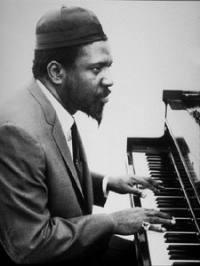
Thelonious Sphere Monk was an American jazz pianist and composer. He had a unique improvisational style and made numerous contributions to the standard jazz repertoire, including "'Round Midnight", "Blue Monk", "Straight, No Chaser", "Ruby, My Dear", "In Walked Bud", and "Well, You Needn't"
The Shadows
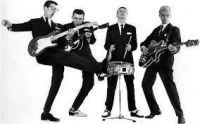
The Shadows (originally known as the Drifters) were an English instrumental rock group. They were Cliff Richard's backing band from 1958 to 1968 and on numerous reunion tours. The Shadows have had 69 UK chart singles from the 1950s to the 2000s, 35 credited to the Shadows and 34 to Cliff Richard and the Shadows. The group, who were in the forefront of the UK beat-group boom, were the first backing band to emerge as stars. As pioneers of the four-member instrumental format, the band consisted of lead guitar, rhythm guitar, bass guitar and drums. Their range covers pop, rock, surf rock and ballads with a jazz influence.[
Green Day

Green Day is an American rock trio formed in 1987. The band has consisted of Billie Joe Armstrong (vocals, guitar), Mike Dirnt (bass guitar, vocals), and Tré Cool (drums, percussion) for the majority of its existence.
Green Day was originally part of the punk rock scene at 924 Gilman Street in Berkeley, California. Its early releases for independent record label Lookout! Records earned them a grassroots fanbase, some of whom felt alienated when the band signed to a major label.
The band has sold over 65 million records worldwide, They also have three Grammy Awards, Best Alternative Album for Dookie, Best Rock Album for American Idiot, and Record of the Year for "Boulevard of Broken Dreams".
Green Day was originally part of the punk rock scene at 924 Gilman Street in Berkeley, California. Its early releases for independent record label Lookout! Records earned them a grassroots fanbase, some of whom felt alienated when the band signed to a major label.
The band has sold over 65 million records worldwide, They also have three Grammy Awards, Best Alternative Album for Dookie, Best Rock Album for American Idiot, and Record of the Year for "Boulevard of Broken Dreams".
Miles Davis

Miles Dewey Davis III (May 26, 1926 – September 28, 1991) was an American trumpeter, bandleader, and composer.
Widely considered one of the most influential musicians of the 20th century, Miles Davis was, with his musical groups, at the forefront of several major developments in jazz music, including bebop, cool jazz, hard bop, modal jazz, and jazz fusion. Many well-known musicians rose to prominence as members of Davis' ensembles, including saxophonists Gerry Mulligan, John Coltrane, Cannonball Adderley, George Coleman, Wayne Shorter, Dave Liebman, Branford Marsalis and Kenny Garrett; trombonist J. J. Johnson; pianists Horace Silver, Red Garland, Wynton Kelly, Bill Evans, Herbie Hancock, Joe Zawinul, Chick Corea, and Keith Jarrett; guitarists John McLaughlin, Pete Cosey, John Scofield and Mike Stern; bassists Paul Chambers, Ron Carter, Dave Holland, Marcus Miller and Darryl Jones ; and drummers Philly Joe Jones, Jimmy Cobb, Tony Williams, Billy Cobham, Jack DeJohnette, and Al Foster.
On October 7, 2008, his album Kind of Blue, released in 1959, received its fourth platinum certification from the RIAA, signifying sales of 4 million copies. Miles Davis was inducted into the Rock and Roll Hall of Fame in 2006. Davis was noted as "one of the key figures in the history of jazz".
On November 5, 2009, Rep. John Conyers of Michigan sponsored a measure in the US House of Representatives to recognize and commemorate the album Kind of Blue on its 50th anniversary. The measure also affirms jazz as a national treasure and "encourages the United States government to preserve and advance the art form of jazz music." It passed, unanimously, with a vote of 409–0 on December 15, 2009.
Widely considered one of the most influential musicians of the 20th century, Miles Davis was, with his musical groups, at the forefront of several major developments in jazz music, including bebop, cool jazz, hard bop, modal jazz, and jazz fusion. Many well-known musicians rose to prominence as members of Davis' ensembles, including saxophonists Gerry Mulligan, John Coltrane, Cannonball Adderley, George Coleman, Wayne Shorter, Dave Liebman, Branford Marsalis and Kenny Garrett; trombonist J. J. Johnson; pianists Horace Silver, Red Garland, Wynton Kelly, Bill Evans, Herbie Hancock, Joe Zawinul, Chick Corea, and Keith Jarrett; guitarists John McLaughlin, Pete Cosey, John Scofield and Mike Stern; bassists Paul Chambers, Ron Carter, Dave Holland, Marcus Miller and Darryl Jones ; and drummers Philly Joe Jones, Jimmy Cobb, Tony Williams, Billy Cobham, Jack DeJohnette, and Al Foster.
On October 7, 2008, his album Kind of Blue, released in 1959, received its fourth platinum certification from the RIAA, signifying sales of 4 million copies. Miles Davis was inducted into the Rock and Roll Hall of Fame in 2006. Davis was noted as "one of the key figures in the history of jazz".
On November 5, 2009, Rep. John Conyers of Michigan sponsored a measure in the US House of Representatives to recognize and commemorate the album Kind of Blue on its 50th anniversary. The measure also affirms jazz as a national treasure and "encourages the United States government to preserve and advance the art form of jazz music." It passed, unanimously, with a vote of 409–0 on December 15, 2009.
Oskar Nedbal
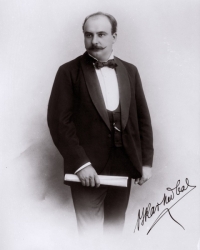
Oskar Nedbal (26 March 1874 – 24 December 1930) was a Czech violist, composer, and conductor of classical musicHe was principal conductor with the Czech Philharmonic Orchestra from 1896 to 1906 and was a founder member of the Bohemian String Quartet.Although a great admirer of his teacher Antonín Dvořák, Nedbal paid homage to other composers. For example, in his 1910 composition, Romantic Piece, Op. 18 for cello and piano, Nedbal cleverly inserts a theme usually associated with Mozart, Ah, vous dirai-je, Maman.His works include one (unsuccessful) opera, Jakob the Peasant (1919–1920), and the operettas Chaste Barbara (1910), Polish Blood (1913), The Vineyard Bride (1916), and Beautiful Saskia (1917).in 1926 he conducted the premiere of Jan Levoslav Bella's opera, Wieland der Schmied in Bratislava.
Sting
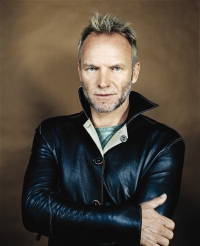
Gordon Matthew Thomas Sumner, CBE (born October 2, 1951), better known by his stage name Sting, is a three time Academy Award-nominated and multiple Grammy-winning English musician from Wallsend in North Tyneside. Prior to starting his solo career, he was the principal songwriter, lead singer and bassist of the rock band The Police. As a solo musician and member of The Police, Sting has sold over 100 million records, and received over sixteen Grammy Awards for his work, receiving his first Grammy for Best Rock Instrumental Performance in 1981, and receiving an Oscar nomination for best song.
Sting has stated that he gained his nickname while with the Phoenix Jazzmen. He once performed wearing a black and yellow sweater with hooped stripes that bandleader Gordon Solomon had noted made him look like a bumblebee; thus Sumner became "Sting". He uses Sting almost exclusively, except on official documents. In a press conference filmed in the movie Bring on the Night, he jokingly stated when referred to by a journalist as Gordon, "My children call me Sting, my mother calls me Sting, who is this Gordon character?"
Sting has stated that he gained his nickname while with the Phoenix Jazzmen. He once performed wearing a black and yellow sweater with hooped stripes that bandleader Gordon Solomon had noted made him look like a bumblebee; thus Sumner became "Sting". He uses Sting almost exclusively, except on official documents. In a press conference filmed in the movie Bring on the Night, he jokingly stated when referred to by a journalist as Gordon, "My children call me Sting, my mother calls me Sting, who is this Gordon character?"
Django Reinhardt
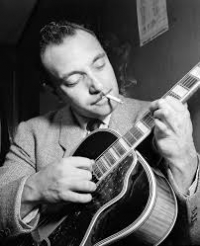
Jean Reinhardt (23 January 1910 – 16 May 1953), known by his stage name Django Reinhardt (French: or ), was a Belgian-born Romani-French jazz guitarist and composer, regarded as one of the greatest musicians of the twentieth century. He was the first jazz talent to emerge from Europe and remains the most significant.:cover
With violinist Stéphane Grappelli, Reinhardt formed the Paris-based Quintette du Hot Club de France in 1934. The group was among the first to play jazz that featured the guitar as a lead instrument. Reinhardt recorded in France with many visiting American musicians, including Coleman Hawkins and Benny Carter, and briefly toured the United States with Duke Ellington's orchestra in 1946. He died suddenly of a stroke at the age of 43.
Reinhardt's most popular compositions have become standards within gypsy jazz, including "Minor Swing", "Daphne", "Belleville", "Djangology", "Swing '42", and "Nuages". Jazz guitarist Frank Vignola claims that nearly every major popular-music guitarist in the world has been influenced by Reinhardt. Over the last few decades, annual Django festivals have been held throughout Europe and the U.S., and a biography has been written about his life. In February 2017, the Berlin International Film Festival held the world premiere of the French film, Django
With violinist Stéphane Grappelli, Reinhardt formed the Paris-based Quintette du Hot Club de France in 1934. The group was among the first to play jazz that featured the guitar as a lead instrument. Reinhardt recorded in France with many visiting American musicians, including Coleman Hawkins and Benny Carter, and briefly toured the United States with Duke Ellington's orchestra in 1946. He died suddenly of a stroke at the age of 43.
Reinhardt's most popular compositions have become standards within gypsy jazz, including "Minor Swing", "Daphne", "Belleville", "Djangology", "Swing '42", and "Nuages". Jazz guitarist Frank Vignola claims that nearly every major popular-music guitarist in the world has been influenced by Reinhardt. Over the last few decades, annual Django festivals have been held throughout Europe and the U.S., and a biography has been written about his life. In February 2017, the Berlin International Film Festival held the world premiere of the French film, Django
Astor Piazzolla

Ástor Pantaleón Piazzolla (March 11, 1921 – July 4, 1992) was an Argentine tango composer and bandoneón player. His oeuvre revolutionized the traditional tango into a new style termed nuevo tango, incorporating elements from jazz and classical music. An excellent bandoneonist, he regularly performed his own compositions with different ensembles.
Piazzolla's nuevo tango was distinct from the traditional tango in its incorporation of elements of jazz, its use of extended harmonies and dissonance, its use of counterpoint, and its ventures into extended compositional forms. As Argentine psychoanalyst Carlos Kuri has pointed out, Piazzolla's fusion of tango with this wide range of other recognizable Western musical elements was so successful that it produced a new individual style transcending these influences. It is precisely this success, and individuality, that makes it hard to pin down where particular influences reside in his compositions, but some aspects are clear. The use of the passacaglia technique of a circulating bass line and harmonic sequence, invented and much used in 17th and 18th century baroque music but also central to the idea of jazz "changes", predominates in most of Piazzolla's mature compositions. Another clear reference to the baroque is the often complex and virtuosic counterpoint that sometimes follows strict fugal behavior but more often simply allows each performer in the group to assert his voice. A further technique that emphasises this sense of democracy and freedom among the musicians is improvisation that is borrowed from jazz in concept, but in practice involves a different vocabulary of scales and rhythms that stay within the parameters of the established tango sound-world. Pablo Ziegler has been particularly responsible for developing this aspect of the style both within Piazzolla's groups and since the composer's death.
Piazzolla's nuevo tango was distinct from the traditional tango in its incorporation of elements of jazz, its use of extended harmonies and dissonance, its use of counterpoint, and its ventures into extended compositional forms. As Argentine psychoanalyst Carlos Kuri has pointed out, Piazzolla's fusion of tango with this wide range of other recognizable Western musical elements was so successful that it produced a new individual style transcending these influences. It is precisely this success, and individuality, that makes it hard to pin down where particular influences reside in his compositions, but some aspects are clear. The use of the passacaglia technique of a circulating bass line and harmonic sequence, invented and much used in 17th and 18th century baroque music but also central to the idea of jazz "changes", predominates in most of Piazzolla's mature compositions. Another clear reference to the baroque is the often complex and virtuosic counterpoint that sometimes follows strict fugal behavior but more often simply allows each performer in the group to assert his voice. A further technique that emphasises this sense of democracy and freedom among the musicians is improvisation that is borrowed from jazz in concept, but in practice involves a different vocabulary of scales and rhythms that stay within the parameters of the established tango sound-world. Pablo Ziegler has been particularly responsible for developing this aspect of the style both within Piazzolla's groups and since the composer's death.
Saint Saens

Charles-Camille Saint-Saëns (9 October 1835 – 16 December 1921) was a French composer, organist, conductor, and pianist, known especially for The Carnival of the Animals, Danse Macabre, Samson and Delilah, Havanaise, Introduction and Rondo capriccioso, and his Symphony No. 3 (Organ Symphony).
Ray Charles
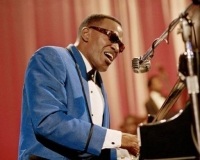
Raymond Charles Robinson (September 23, 1930 â June 10, 2004), known by his stage name Ray Charles, was an American pianist and singer who shaped the sound of rhythm and blues. He brought a soulful sound to country music, pop standards, and a rendition of "America the Beautiful" that Ed Bradley of 60 Minutes called the "definitive version of the song, an American anthem â a classic, just as the man who sung it." Frank Sinatra called him "the only true genius in the business" and in 2004, Rolling Stone Magazine ranked Charles #10 on their list of the 100 Greatest Artists of All Time.
During the late 1960s and into the 1970s, Charles' releases were hit-or-miss, with some big hits and critically acclaimed work. His version of "Georgia On My Mind" was proclaimed the state song of Georgia on April 24, 1979, with Charles performing it on the floor of the state legislature.
He died on June 10, 2004 of hepatocellular carcinoma (liver cancer) at his home in Beverly Hills, California, surrounded by family and friends. His body was interred in the Inglewood Park Cemetery in Inglewood, California. His final album, Genius Loves Company, released two months after his death, consists of duets with various admirers and contemporaries: B.B. King, Van Morrison, Willie Nelson, James Taylor, Gladys Knight, Michael McDonald, Natalie Cole, Elton John, Bonnie Raitt, Diana Krall, Norah Jones, and Johnny Mathis.
During the late 1960s and into the 1970s, Charles' releases were hit-or-miss, with some big hits and critically acclaimed work. His version of "Georgia On My Mind" was proclaimed the state song of Georgia on April 24, 1979, with Charles performing it on the floor of the state legislature.
He died on June 10, 2004 of hepatocellular carcinoma (liver cancer) at his home in Beverly Hills, California, surrounded by family and friends. His body was interred in the Inglewood Park Cemetery in Inglewood, California. His final album, Genius Loves Company, released two months after his death, consists of duets with various admirers and contemporaries: B.B. King, Van Morrison, Willie Nelson, James Taylor, Gladys Knight, Michael McDonald, Natalie Cole, Elton John, Bonnie Raitt, Diana Krall, Norah Jones, and Johnny Mathis.
Pablo de Sarasate

Pablo Martín Melitón de Sarasate y Navascués (10 March 1844 – 20 September 1908) was a Spanish violinist and composer of the Romantic period.
The Legend of Zelda

The Legend of Zelda (Zeruda no Densetsu) is a high fantasy action-adventure video game series created by game designer Shigeru Miyamoto and developed and published by Nintendo. The gameplay consists of a mixture of action, adventure, puzzle solving, role-playing and occasional platforming, stealth and racing elements. The series centers on Link, the main playable character and protagonist. Link is often given the task of rescuing Princess Zelda and the most common setting of the series, Hyrule, from Ganon who is the primary antagonist of the series. However, other settings and antagonists have appeared throughout the games, with Vaati having recently become the series' secondary antagonist. The story commonly involves a relic known as the Triforce, a set of three golden triangles of omnipotence. The protagonist in each game is not always the same iteration of Link, although the same character sometimes appears across multiple games.
The Legend of Zelda series has sold over 52 million copies since the release of the first game, The Legend of Zelda, and continues to be successful worldwide. The series consists of fourteen official games on all of Nintendo's major consoles, as well as several spin-offs. An animated series based on the games aired in 1989, and individual manga adaptions which are officially endorsed and commissioned by Nintendo have been produced in Japan since 1997.
The Legend of Zelda series has sold over 52 million copies since the release of the first game, The Legend of Zelda, and continues to be successful worldwide. The series consists of fourteen official games on all of Nintendo's major consoles, as well as several spin-offs. An animated series based on the games aired in 1989, and individual manga adaptions which are officially endorsed and commissioned by Nintendo have been produced in Japan since 1997.
Antonio Carlos Jobim

Antonio Carlos Brasileiro de Almeida Jobim (January 25, 1927 in Rio de Janeiro – December 8, 1994 in New York City), also known as Tom Jobim, was a Grammy Award-winning Brazilian songwriter, composer, arranger, singer, and pianist/guitarist. A primary force behind the creation of the bossa nova style, Jobim is acknowledged as one of the most influential popular composers of the 20th century. His songs have been performed by many singers and instrumentalists within Brazil and internationally.
Miguel Matamoros
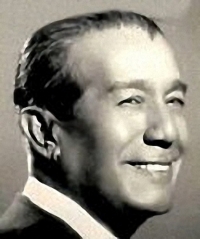
Miguel Matamoros (Santiago de Cuba, 8 de mayo de 1894 - ibídem, 15 de abril de 1971)1fue un músico y compositor cubano. Tuvo una gran contribución al desarrollo del son cubano, ritmo procedente de las zonas rurales del oriente de Cuba. Conocido por ser el autor de temas populares como el bolero-son Lágrimas Negras o el bolero-montuno Son de la Loma que compuso con el Trío Matamoros.2
Flobots
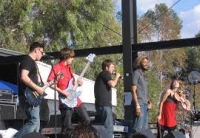
Flobots is an experimental rock band from Jackson, Mississippi, formed in 2005 by Jamie Laurie. The band's origins date back 5 years earlier to a similar project by Laurie. Flobots found mainstream success with their major label debut Fight with Tools (2007), featuring the single "Handlebars", which became a popular hit on Modern Rock radio in April 2008. The band has released four studio albums and one EP, with their latest Noenemies being released in May 2017.
Daniel Alomia Robles
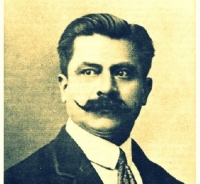
Daniel Alomía Robles (3 January 1871 – 17 July 1942) was a Peruvian composer and ethnomusicologist. He is best known for composing the song "El Cóndor Pasa" in 1913 as part of a zarzuela — a musical play that alternates between spoken and sung parts — of the same name. This song was based on Andean folk songs and is possibly the best known Peruvian song, partly due to the worldwide success that the melody obtained when it was used by Simon and Garfunkel as their music for "El Cóndor Pasa (If I Could)", although that song has different lyrics.
Marcus Miller
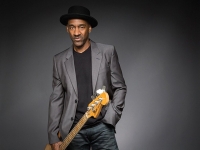
Marcus Miller, American jazz musician, bass player. He has gained an important place in the jazz world with his works with Miles Davis and David Sanborn. Miller studied clarinet; He can play keyboard instruments, bass clarinet and guitar very well and also perform vocals.
Mascagni
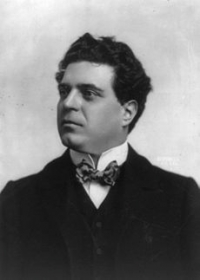
Pietro Antonio Stefano Mascagni (December 7, 1863 – August 2, 1945) was an Italian composer most noted for his operas. His 1890 masterpiece Cavalleria rusticana caused one of the greatest sensations in opera history and single-handedly ushered in the Verismo movement in Italian dramatic music. However, though it has been stated that Mascagni, like Leoncavallo, was a "one-opera man" who could never repeat his first success, this is inaccurate. L'amico Fritz and Iris have been popular in Europe since their respective premieres. In fact, Mascagni himself claimed that at one point Iris was performed in Italy more often than Cavalleria (cf. Stivender).
Mascagni wrote a total of seventeen operas and operetta, several orchestral and vocal works, as well as songs and piano music. He enjoyed immense success during his lifetime, both as a composer and conductor of his own and other people's music. If he never repeated the international success of Cavalleria it was probably because Mascagni refused to copy himself. The variety of styles in his operas — the Sicilian passion and warmth of Cavalleria, the exotic flavor of Iris, the idyllic breeze that ventilates the charming L'amico Fritz and Lodoletta, the Gallic chiaroscuro of Isabeau, the steely, Veristic power of Il piccolo Marat, the overripe postromanticism of the lush Parisina — demonstrate a versatility that surpasses even that of Puccini.
Mascagni wrote a total of seventeen operas and operetta, several orchestral and vocal works, as well as songs and piano music. He enjoyed immense success during his lifetime, both as a composer and conductor of his own and other people's music. If he never repeated the international success of Cavalleria it was probably because Mascagni refused to copy himself. The variety of styles in his operas — the Sicilian passion and warmth of Cavalleria, the exotic flavor of Iris, the idyllic breeze that ventilates the charming L'amico Fritz and Lodoletta, the Gallic chiaroscuro of Isabeau, the steely, Veristic power of Il piccolo Marat, the overripe postromanticism of the lush Parisina — demonstrate a versatility that surpasses even that of Puccini.
Rossini

Gioachino Antonio Rossini (February 29, 1792 – November 13, 1868) was a popular Italian composer who created 39 operas as well as sacred music and chamber music. His best known works include Il barbiere di Siviglia (The Barber of Seville), La Cenerentola and Guillaume Tell (William Tell).
Rossini's most famous opera was produced on February 20, 1816 at the Teatro Argentina in Rome. The libretto by Cesare Sterbini, a version of Pierre Beaumarchais' infamous stage play Le Barbier de Séville, was the same as that already used by Giovanni Paisiello in his own Barbiere, an opera which had enjoyed European popularity for more than a quarter of a century. Much is made of how fast Rossini's opera was written, scholarship generally agreeing upon two weeks. Later in life, Rossini claimed to have written the opera in only twelve days. It was a colossal failure when it premiered as Almaviva; Paisiello’s admirers were extremely indignant, sabotaging the production by whistling and shouting during the entire first act. However, not long after the second performance, the opera became so successful that the fame of Paisiello's opera was transferred to Rossini's, to which the title The Barber of Seville passed as an inalienable heritage.
Rossini's most famous opera was produced on February 20, 1816 at the Teatro Argentina in Rome. The libretto by Cesare Sterbini, a version of Pierre Beaumarchais' infamous stage play Le Barbier de Séville, was the same as that already used by Giovanni Paisiello in his own Barbiere, an opera which had enjoyed European popularity for more than a quarter of a century. Much is made of how fast Rossini's opera was written, scholarship generally agreeing upon two weeks. Later in life, Rossini claimed to have written the opera in only twelve days. It was a colossal failure when it premiered as Almaviva; Paisiello’s admirers were extremely indignant, sabotaging the production by whistling and shouting during the entire first act. However, not long after the second performance, the opera became so successful that the fame of Paisiello's opera was transferred to Rossini's, to which the title The Barber of Seville passed as an inalienable heritage.
Fritz Kreisler

Friedrich "Fritz" Kreisler was an Austrian-born violinist and composer. One of the most noted violin masters of his day, and regarded as one of the greatest violinists of all time, he was known for his sweet tone and expressive phrasing
Taylor Swift

Taylor Alison Swift (born December 13, 1989) is an American country-pop singer-songwriter. In 2006, she released her debut single "Tim McGraw", which peaked at number six on the Billboard country charts. Later in October 2006, she released her self-titled debut album, which produced five hit singles on the Billboard Hot Country Songs charts and was certified 3× Multi-Platinum by the RIAA. The New York Times described Swift as "one of pop's finest songwriters, country’s foremost pragmatist and more in touch with her inner life than most adults".
According to Nielsen SoundScan, Swift was the biggest selling artist of 2008 in America with combined sales of more than four million albums. Swift's Fearless and her self-titled album finished 2008 at number three and number six respectively, with sales of 2.1 and 1.5 million. She was the first artist in the history of Nielsen SoundScan to have two different albums in the Top 10 on the year end album chart. Fearless has topped the Billboard 200 in 11 non-consecutive weeks. No album has spent more time at number one since 1999-2000. It also was the first album by a female artist in country music history to log eight weeks at #1 on The Billboard 200. In mid-January 2009, Swift became the first country artist to top the 2 million mark in paid downloads with three different songs. As of the week ending February 8, 2009, Swift's single "Love Story" became the country song with most paid downloads in history and the first country song to top the Mainstream Top 40 chart. According to the 2009 issue of Forbes, Swift is ranked as the 69th most powerful celebrity with over $18 million dollars in earnings this year.
According to Nielsen SoundScan, Swift was the biggest selling artist of 2008 in America with combined sales of more than four million albums. Swift's Fearless and her self-titled album finished 2008 at number three and number six respectively, with sales of 2.1 and 1.5 million. She was the first artist in the history of Nielsen SoundScan to have two different albums in the Top 10 on the year end album chart. Fearless has topped the Billboard 200 in 11 non-consecutive weeks. No album has spent more time at number one since 1999-2000. It also was the first album by a female artist in country music history to log eight weeks at #1 on The Billboard 200. In mid-January 2009, Swift became the first country artist to top the 2 million mark in paid downloads with three different songs. As of the week ending February 8, 2009, Swift's single "Love Story" became the country song with most paid downloads in history and the first country song to top the Mainstream Top 40 chart. According to the 2009 issue of Forbes, Swift is ranked as the 69th most powerful celebrity with over $18 million dollars in earnings this year.
Mariachi Vargas

Mariachi Vargas De Tecalitlán is a Mexican folk ensemble of mariachi music created in 1897 by Gaspar Vargas. From 1950 it has been under the artistic guidance of Rubén Fuentes. The group's musical direction had been the responsibility of Don Jose "Pepe" Martínez from 1975 to around 2013-14. Now the ensemble is under the direction of Carlos Martínez (ex-director of Mariachi Nuevo Tecalitlan).
The Secret Garden

The Secret Garden is a musical based on the 1909 novel of the same name by Frances Hodgson Burnett. The musical's book and lyrics are by Marsha Norman, with music by Lucy Simon. It premiered on Broadway at the St. James Theatre on 25 April 1991 and closed on 3 January 1993 after 709 performances.
The musical, set in 1906, tells of a young English girl, Mary, who is forced to move to England from colonial India when her parents die in a cholera outbreak. There she lives with her emotionally stunted Uncle Archibald and her invalid cousin. Discovering a hidden and neglected garden, and bravely overcoming dark forces, she and a young gardener bring it back to life at the same time as she brings new life to her cousin and uncle.
The Secret Garden garnered the 1991 Tony Awards for Best Book of a Musical, Best Featured Actress in a Musical (Daisy Eagan), and Best Scenic Design (Heidi Landesman). The set resembled an enormous Victorian toy theatre with pop-out figures, large paper dolls, and Joseph Cornell-like collage elements.
The musical, set in 1906, tells of a young English girl, Mary, who is forced to move to England from colonial India when her parents die in a cholera outbreak. There she lives with her emotionally stunted Uncle Archibald and her invalid cousin. Discovering a hidden and neglected garden, and bravely overcoming dark forces, she and a young gardener bring it back to life at the same time as she brings new life to her cousin and uncle.
The Secret Garden garnered the 1991 Tony Awards for Best Book of a Musical, Best Featured Actress in a Musical (Daisy Eagan), and Best Scenic Design (Heidi Landesman). The set resembled an enormous Victorian toy theatre with pop-out figures, large paper dolls, and Joseph Cornell-like collage elements.
Brahms

Johannes Brahms (May 7, 1833 â April 3, 1897) was a German composer of the Romantic period. He was born in Hamburg and in his later years he settled in Vienna, Austria.
Brahms maintained a Classical sense of form and order in his works â in contrast to the opulence of the music of many of his contemporaries. Thus many admirers (though not necessarily Brahms himself) saw him as the champion of traditional forms and "pure music," as opposed to the New German embrace of program music.
Brahms venerated Beethoven: in the composer's home, a marble bust of Beethoven looked down on the spot where he composed, and some passages in his works are reminiscent of Beethoven's style. The main theme of the finale of Brahms's First Symphony is reminiscent of the main theme of the finale of Beethoven's Ninth, and when this resemblance was pointed out to Brahms he replied that any ass â jeder Esel â could see that.
Ein deutsches Requiem was partially inspired by his mother's death in 1865, but also incorporates material from a Symphony he started in 1854, but abandoned following Schumann's suicide attempt. He once wrote that the Requiem "belonged to Schumann". The first movement of this abandoned Symphony was re-worked as the first movement of the First Piano Concerto.
Brahms also loved the Classical composers Mozart and Haydn. He collected first editions and autographs of their works, and edited performing editions. He also studied the music of pre-classical composers, including Giovanni Gabrieli, Johann Adolph Hasse, Heinrich Schütz and especially Johann Sebastian Bach. His friends included leading musicologists, and with Friedrich Chrysander he edited an edition of the works of François Couperin. He looked to older music for inspiration in the arts of strict counterpoint; the themes of some of his works are modelled on Baroque sources, such as Bach's The Art of Fugue in the fugal finale of Cello Sonata No. 1, or the same composer's Cantata No. 150 in the passacaglia theme of the Fourth Symphony's finale.
Brahms maintained a Classical sense of form and order in his works â in contrast to the opulence of the music of many of his contemporaries. Thus many admirers (though not necessarily Brahms himself) saw him as the champion of traditional forms and "pure music," as opposed to the New German embrace of program music.
Brahms venerated Beethoven: in the composer's home, a marble bust of Beethoven looked down on the spot where he composed, and some passages in his works are reminiscent of Beethoven's style. The main theme of the finale of Brahms's First Symphony is reminiscent of the main theme of the finale of Beethoven's Ninth, and when this resemblance was pointed out to Brahms he replied that any ass â jeder Esel â could see that.
Ein deutsches Requiem was partially inspired by his mother's death in 1865, but also incorporates material from a Symphony he started in 1854, but abandoned following Schumann's suicide attempt. He once wrote that the Requiem "belonged to Schumann". The first movement of this abandoned Symphony was re-worked as the first movement of the First Piano Concerto.
Brahms also loved the Classical composers Mozart and Haydn. He collected first editions and autographs of their works, and edited performing editions. He also studied the music of pre-classical composers, including Giovanni Gabrieli, Johann Adolph Hasse, Heinrich Schütz and especially Johann Sebastian Bach. His friends included leading musicologists, and with Friedrich Chrysander he edited an edition of the works of François Couperin. He looked to older music for inspiration in the arts of strict counterpoint; the themes of some of his works are modelled on Baroque sources, such as Bach's The Art of Fugue in the fugal finale of Cello Sonata No. 1, or the same composer's Cantata No. 150 in the passacaglia theme of the Fourth Symphony's finale.
Antonin Dvorak

Antonín Leopold Dvořák (English pronunciation: /ˈdvɒrʒɑːk/ DVOR-zhahk or /ˈdvɒrʒæk/ DVOR-zhak; Czech: ( listen); September 8, 1841 – May 1, 1904) was a Czech composer of Romantic music, who employed the idioms of the folk music of Moravia and his native Bohemia. His works include operas, symphonic, choral and chamber music. His best-known works include his New World Symphony, the Slavonic Dances, "American" String Quartet, and Cello Concerto in B minor.
Dvořák wrote in a variety of forms: his nine symphonies generally stick to classical models that Beethoven would have recognised, but he also worked in the newly developed symphonic poem form and the influence of Richard Wagner is apparent in some works. Many of his works also show the influence of Czech folk music, both in terms of rhythms and melodic shapes; perhaps the best known examples are the two sets of Slavonic Dances. Dvořák also wrote operas (of which the best known is Rusalka); serenades for string orchestra and wind ensemble; chamber music (including a number of string quartets, and quintets); songs; choral music; and piano music.
Dvořák wrote in a variety of forms: his nine symphonies generally stick to classical models that Beethoven would have recognised, but he also worked in the newly developed symphonic poem form and the influence of Richard Wagner is apparent in some works. Many of his works also show the influence of Czech folk music, both in terms of rhythms and melodic shapes; perhaps the best known examples are the two sets of Slavonic Dances. Dvořák also wrote operas (of which the best known is Rusalka); serenades for string orchestra and wind ensemble; chamber music (including a number of string quartets, and quintets); songs; choral music; and piano music.
Felix Mendelssohn

Jakob Ludwig Felix Mendelssohn Bartholdy, born, and generally known in English-speaking countries, as Felix Mendelssohn (February 3, 1809 – November 4, 1847) was a German composer, pianist, organist and conductor of the early Romantic period.
The grandson of the philosopher Moses Mendelssohn, he was born into a notable Jewish family, although he himself was brought up initially without religion, and later as a Lutheran. He was recognized early as a musical prodigy, but his parents were cautious and did not seek to capitalise on his abilities. Indeed his father was disinclined to allow Felix to follow a musical career until it became clear that he intended to seriously dedicate himself to it.
Early success in Germany was followed by travel throughout Europe; Mendelssohn was particularly well received in England as a composer, conductor and soloist, and his ten visits there, during which many of his major works were premiered, form an important part of his adult career. His essentially conservative musical tastes however set him apart from many of his more adventurous musical contemporaries such as Liszt, Wagner and Berlioz. The Conservatory he founded at Leipzig became a bastion of this anti-radical outlook.
Mendelssohn's work includes symphonies, concerti, oratorios, piano and chamber music. He also had an important role in the revival of interest in the music of Johann Sebastian Bach. After a long period of relative denigration due to changing musical tastes and antisemitism in the late 19th and early 20th centuries, his creative originality is now being recognized and re-evaluated. He is now among the most popular composers of the Romantic era.
The grandson of the philosopher Moses Mendelssohn, he was born into a notable Jewish family, although he himself was brought up initially without religion, and later as a Lutheran. He was recognized early as a musical prodigy, but his parents were cautious and did not seek to capitalise on his abilities. Indeed his father was disinclined to allow Felix to follow a musical career until it became clear that he intended to seriously dedicate himself to it.
Early success in Germany was followed by travel throughout Europe; Mendelssohn was particularly well received in England as a composer, conductor and soloist, and his ten visits there, during which many of his major works were premiered, form an important part of his adult career. His essentially conservative musical tastes however set him apart from many of his more adventurous musical contemporaries such as Liszt, Wagner and Berlioz. The Conservatory he founded at Leipzig became a bastion of this anti-radical outlook.
Mendelssohn's work includes symphonies, concerti, oratorios, piano and chamber music. He also had an important role in the revival of interest in the music of Johann Sebastian Bach. After a long period of relative denigration due to changing musical tastes and antisemitism in the late 19th and early 20th centuries, his creative originality is now being recognized and re-evaluated. He is now among the most popular composers of the Romantic era.
Peter Asplund
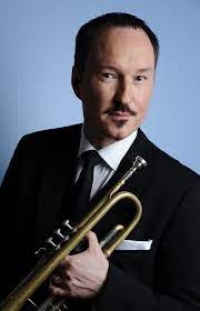
Peter Asplund, Swedish jazz trumpeter, singer, and composer. Born 26 September 1969. Asplund studied at the Royal College of Music in Stockholm. He has recorded a number of solo albums and even participated as solo artist on records with other artists, like Lisa Ekdahl, and Viktoria Tolstoy. He earlier plaid and toured regularly with Bo Kaspers Orkester.In 2010 Asplund released an album, Asplund Meets Bernstein, in cooperation with Mats Hålling - a Swedish composer and arranger - and Dalasinfoniettan - a regional chamber orchestra. In 2014 the Konserthuset, Stockholm - the home for the Royal Stockholm Philharmonic Orchestra - presented a concert (available as a video) with Peter Asplund and the Swedish Chamber Orchestra, led by Mats Hålling.
William Henry Squire
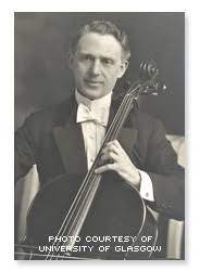
William Henry Squire, ARCM (8 August 1871 – 17 March 1963) was a British cellist, composer and music professor of the late 19th and early 20th centuries. He studied cello at the Royal College of Music, and became professor of cello at the Royal College and Guildhall schools of music. He was principal cello in several major London orchestras and helped to popularize the cello as a solo instrument in the early years of the 20th century by giving public concerts throughout the British Isles and making recordings; he became well known for his performances of the Elgar and Saint-Saëns cello concertos. In 1898 the French composer Gabriel Fauré dedicated his cello piece Sicilienne to Squire. Squire's own compositions were written mainly for the cello; these included several solo pieces of light character and a cello concerto; he also wrote the music for a number of songs.
Osvaldo Farrés
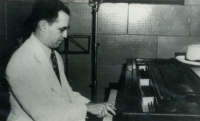
Osvaldo Farrés (January 13, 1903- December 22, 1985) was a Cuban songwriter and composer best known for having written the songs "Quizás, Quizás, Quizás", "Acercate Mas", "En El Mar", and "Tres Palabras.Although unable to read or write music, he became a prolific and world-renowned composer. His songs include "Quizás, Quizás, Quizás", "Acercate Mas", "Tres Palabras", "Toda Una Vida" and his own favorite "Madrecita" written in honor of his mother and sung to this day in Latin America on Mother's Day.
Traditional

Bee Gees
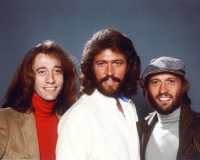
The Bee Gees were a singing trio of brothers — Barry, Robin, and Maurice Gibb. They were born on the Isle of Man to English parents, lived in Chorlton, Manchester, England and during their childhood years moved to Brisbane, Australia, where they began their musical careers. Their worldwide success came when they returned to England and signed with producer Robert Stigwood.
The multiple award-winning group was successful for most of its forty years of recording music, but it had two distinct periods of exceptional success: as a harmonic "soft rock" act in the late 1960s and early 1970s, and as the foremost stars of the disco music era in the late 1970s.
No matter the style, the Bee Gees sang three-part tight harmonies that were instantly recognizable; as brothers, their voices blended perfectly, in the same way that The Everly Brothers and Beach Boys did. Barry sang lead on many songs, and an R&B falsetto introduced in the disco years; Robin provided the clear vibrato lead that was a hallmark of their pre-disco music; Maurice sang high and low harmonies throughout their career. The three brothers co-wrote most of their hits, and they said that they felt like they became 'one person' when they were writing. The group's name was retired after Maurice died in January 2003.
The Bee Gees were inducted into The Rock and Roll Hall of Fame in 1997; fittingly, the presenter of the award to "Britain's first family of harmony" was Brian Wilson, leader of the Beach Boys, America's first family of rock harmony.
It has been estimated that the Bee Gees' record sales total more than 220 million, easily making them one of the best-selling music artists of all-time. The above figure in record sales does not include record sales for artists for whom they have written and with whom they have collaborated. Their 1997 Rock and Roll Hall of Fame citation says "Only Elvis Presley, The Beatles, Michael Jackson, Garth Brooks and Paul McCartney have outsold the Bee Gees".
The multiple award-winning group was successful for most of its forty years of recording music, but it had two distinct periods of exceptional success: as a harmonic "soft rock" act in the late 1960s and early 1970s, and as the foremost stars of the disco music era in the late 1970s.
No matter the style, the Bee Gees sang three-part tight harmonies that were instantly recognizable; as brothers, their voices blended perfectly, in the same way that The Everly Brothers and Beach Boys did. Barry sang lead on many songs, and an R&B falsetto introduced in the disco years; Robin provided the clear vibrato lead that was a hallmark of their pre-disco music; Maurice sang high and low harmonies throughout their career. The three brothers co-wrote most of their hits, and they said that they felt like they became 'one person' when they were writing. The group's name was retired after Maurice died in January 2003.
The Bee Gees were inducted into The Rock and Roll Hall of Fame in 1997; fittingly, the presenter of the award to "Britain's first family of harmony" was Brian Wilson, leader of the Beach Boys, America's first family of rock harmony.
It has been estimated that the Bee Gees' record sales total more than 220 million, easily making them one of the best-selling music artists of all-time. The above figure in record sales does not include record sales for artists for whom they have written and with whom they have collaborated. Their 1997 Rock and Roll Hall of Fame citation says "Only Elvis Presley, The Beatles, Michael Jackson, Garth Brooks and Paul McCartney have outsold the Bee Gees".
J. S. Bach
Johann Sebastian Bach (21 March 1685, O.S.31 March 1685, N.S. – 28 July 1750, N.S.) was a German composer, organist, harpsichordist, violist, and violinist whose sacred and secular works for choir, orchestra, and solo instruments drew together the strands of the Baroque period and brought it to its ultimate maturity. Although he did not introduce new forms, he enriched the prevailing German style with a robust contrapuntal technique, an unrivalled control of harmonic and motivic organisation, and the adaptation of rhythms, forms and textures from abroad, particularly from Italy and France.
Revered for their intellectual depth, technical command and artistic beauty, Bach's works include the Brandenburg Concertos, the Goldberg Variations, the Partitas, The Well-Tempered Clavier, the Mass in B minor, the St Matthew Passion, the St John Passion, the Magnificat, A Musical Offering, The Art of Fugue, the English and French Suites, the Sonatas and Partitas for solo violin, the Cello Suites, more than 200 surviving cantatas, and a similar number of organ works, including the famous Toccata and Fugue in D minor and Passacaglia and Fugue in C minor, as well as the Great Eighteen Chorale Preludes and Organ Mass.
Bach's abilities as an organist were highly respected throughout Europe during his lifetime, although he was not widely recognised as a great composer until a revival of interest and performances of his music in the first half of the 19th century. He is now generally regarded as one of the main composers of the Baroque style, and as one of the greatest composers of all time.
Revered for their intellectual depth, technical command and artistic beauty, Bach's works include the Brandenburg Concertos, the Goldberg Variations, the Partitas, The Well-Tempered Clavier, the Mass in B minor, the St Matthew Passion, the St John Passion, the Magnificat, A Musical Offering, The Art of Fugue, the English and French Suites, the Sonatas and Partitas for solo violin, the Cello Suites, more than 200 surviving cantatas, and a similar number of organ works, including the famous Toccata and Fugue in D minor and Passacaglia and Fugue in C minor, as well as the Great Eighteen Chorale Preludes and Organ Mass.
Bach's abilities as an organist were highly respected throughout Europe during his lifetime, although he was not widely recognised as a great composer until a revival of interest and performances of his music in the first half of the 19th century. He is now generally regarded as one of the main composers of the Baroque style, and as one of the greatest composers of all time.
Claude Bolling
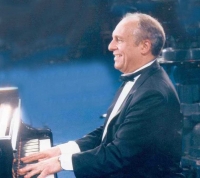
Claude Bolling (born 10 April 1930), is a renowned French jazz pianist, composer, arranger, and occasional actor.
He was born in Cannes, studied at the Nice Conservatory, then in Paris. A child prodigy, by age 14 he was playing jazz piano professionally, with Lionel Hampton, Roy Eldridge, and Kenny Clarke. Bolling's books on jazz technique show that he did not delve far beyond bebop into much avant garde jazz. He was a major part of the traditional jazz revival in the late 1960s, and he became friends with Oscar Peterson.
He has written music for over one hundred films, mostly French, starting with the score for a 1957 documentary about the Cannes Film Festival, and including the films Borsalino (1970), and California Suite (1978).
Bolling is also noted for a series of "crossover" collaborations with classical musicians. His Suite for Flute and Jazz Piano Trio with Jean-Pierre Rampal, a mix of Baroque elegance with modern swing, has been a top seller for many years, and was followed up by other works in the same vein. It was particularly popular in the United States, at the top of the hit parade for two years after its release and on billboard top 40 for 530 weeks, roughly ten years.
Following his work with Rampal, Bolling went on to work with many other musicians, from different genres, including Alexandre Lagoya, Pinchas Zukerman, Maurice André, and Yo-Yo Ma. He has also worked with, and performed tributes to many others, including Lionel Hampton, Duke Ellington, Stéphane Grappelli, Django Reinhardt, Oscar Peterson.
He was born in Cannes, studied at the Nice Conservatory, then in Paris. A child prodigy, by age 14 he was playing jazz piano professionally, with Lionel Hampton, Roy Eldridge, and Kenny Clarke. Bolling's books on jazz technique show that he did not delve far beyond bebop into much avant garde jazz. He was a major part of the traditional jazz revival in the late 1960s, and he became friends with Oscar Peterson.
He has written music for over one hundred films, mostly French, starting with the score for a 1957 documentary about the Cannes Film Festival, and including the films Borsalino (1970), and California Suite (1978).
Bolling is also noted for a series of "crossover" collaborations with classical musicians. His Suite for Flute and Jazz Piano Trio with Jean-Pierre Rampal, a mix of Baroque elegance with modern swing, has been a top seller for many years, and was followed up by other works in the same vein. It was particularly popular in the United States, at the top of the hit parade for two years after its release and on billboard top 40 for 530 weeks, roughly ten years.
Following his work with Rampal, Bolling went on to work with many other musicians, from different genres, including Alexandre Lagoya, Pinchas Zukerman, Maurice André, and Yo-Yo Ma. He has also worked with, and performed tributes to many others, including Lionel Hampton, Duke Ellington, Stéphane Grappelli, Django Reinhardt, Oscar Peterson.
Henry Purcell

Henry Purcell (pronounced /ˈpɜrsəl/; 10 September 1659 (?) – 21 November 1695), was an English organist and Baroque composer of secular and sacred music. Although Purcell incorporated Italian and French stylistic elements into his compositions, his legacy was a uniquely English form of Baroque music.
Younha

Younha (Korean Hangul: 고윤하; hanja: 高潤荷; Go Yoon-ha, Japanese Katakana: ユンナ, Yunna) born April 29, 1988 in Seoul, Korea, is a K-Pop and J-Pop South Korean singer.
Younha made her debut as an artist at the young age of sixteen. Nicknamed the "Oricon comet" for her success in Japan, she has released eight singles and two albums there with varying degrees of success. Several of her songs have been featured in anime and drama series.
Younha was signed to Epic Records, a branch of Sony Music Entertainment Japan, from 2004 to 2008, after which she moved to Sistus Records, a Geneon Entertainment label. In South Korea, she is signed to Lion Media and Stam Entertainment.
Younha made her debut as an artist at the young age of sixteen. Nicknamed the "Oricon comet" for her success in Japan, she has released eight singles and two albums there with varying degrees of success. Several of her songs have been featured in anime and drama series.
Younha was signed to Epic Records, a branch of Sony Music Entertainment Japan, from 2004 to 2008, after which she moved to Sistus Records, a Geneon Entertainment label. In South Korea, she is signed to Lion Media and Stam Entertainment.
Benjamin Britten
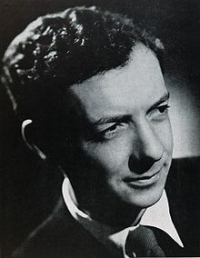
Edward Benjamin Britten, Baron Britten of Aldeburgh, OM CH (22 November 1913 – 4 December 1976) was an English composer, conductor, and pianist. Showing prodigious talent from an early age – he composed his Quatre Chansons françaises for soprano and orchestra at the age of fourteen – he first came to public attention with the a cappella choral work A Boy Was Born. With the premiere of his opera Peter Grimes in 1945 he leapt to international fame, and for the next fifteen years he devoted much of his compositional attention to writing operas, several of which now appear regularly on international stages. Britten's interests as a composer were wide-ranging; he produced important music in such varied genres as orchestral, choral, solo vocal (much of it written for the tenor Peter Pears), chamber and instrumental, as well as film music. He also took a great interest in writing music for children and amateur performers, and was considered a fine pianist and conductor.
Astor Piazzola

Astor Pantaleón Piazzolla (Spanish pronunciation: , Italian pronunciation: ; March 11, 1921 – July 4, 1992) was an Argentine tango composer, bandoneon player, and arranger. His oeuvre revolutionized the traditional tango into a new style termed nuevo tango, incorporating elements from jazz and classical music. A virtuoso bandoneonist, he regularly performed his own compositions with a variety of ensembles.
In 1992, American music critic Stephen Holden described Piazzolla as "the world's foremost composer of tango music"
In 1992, American music critic Stephen Holden described Piazzolla as "the world's foremost composer of tango music"
Mumford & Sons
Mumford & Sons are an English Indie folk band from London. The band is made up of Marcus Mumford (vocals, guitar, drums, mandolin), Country Winston or Marshall Winston (vocals, banjo, dobro), Ben Lovett (vocals, keyboards, organ), Ted Dwane (vocals, double bass). The band formed in late 2007, rising out of London's folk scene with other artists such as Laura Marling, Johnny Flynn, Jay Jay Pistolet and Noah and the Whale.
The band have often supported Laura Marling at concerts, while their association with Noah and the Whale can be traced back to St Paul's School, Barnes and King's College School, Wimbledon. Mumford and Lovett attended King's College School alongside Noah and the Whale bassist Matt Owens, while Marshall attended St Paul's School along with Charlie Fink, lead singer of Noah and the Whale.
The band's debut album, Sigh No More, was released in the United Kingdom in October 2009, and February 2010 in the United States.
The band have often supported Laura Marling at concerts, while their association with Noah and the Whale can be traced back to St Paul's School, Barnes and King's College School, Wimbledon. Mumford and Lovett attended King's College School alongside Noah and the Whale bassist Matt Owens, while Marshall attended St Paul's School along with Charlie Fink, lead singer of Noah and the Whale.
The band's debut album, Sigh No More, was released in the United Kingdom in October 2009, and February 2010 in the United States.
 Sheet Music Network is a site for those who wants to access popular sheet music easily,
letting them download the sheet music for free for trial purposes.
It's completely free to download and try the listed sheet music, but you have to delete the files after 24 hours of trial.
Don't forget, if you like the piece of music you have just learned playing,
treat the artist with respect, and go buy the original sheet music.
Sheet Music Network is a site for those who wants to access popular sheet music easily,
letting them download the sheet music for free for trial purposes.
It's completely free to download and try the listed sheet music, but you have to delete the files after 24 hours of trial.
Don't forget, if you like the piece of music you have just learned playing,
treat the artist with respect, and go buy the original sheet music.
